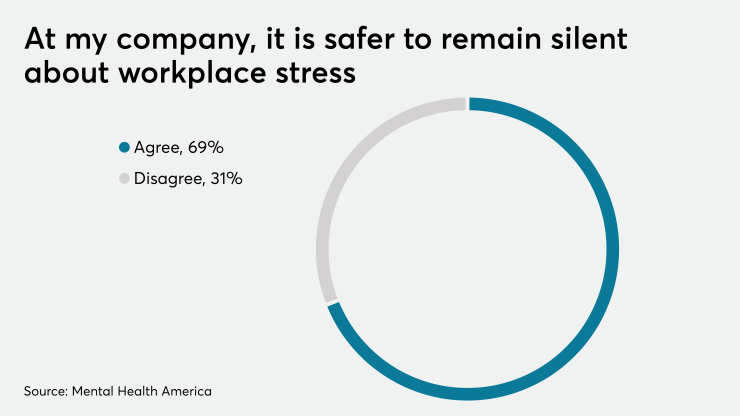Much of the devastation wrought by COVID-19 is easily visible. Millions of Americans have fallen ill, and tens of thousands have died. Across society, we are living without the social connections we usually enjoy. We are balancing childcare and work without the support we typically rely on. We are missing the comforts of our favorite activities such as going to restaurants, salons, or fitness centers.
Other manifestations of the pandemic are less visible. We fear for our health and our families. We struggle to manage our uncertainty about the future and what will happen to our jobs, finances, and plans. We feel out of control and forced from routines that brought us purpose, comfort, and normalcy. All of these struggles take a toll on our mental health.
Fifty five percent of Americans say the coronavirus is affecting their mental health. As a company that provides mental health services, we see that symptom severity among Lyra clients has spiked
Employers can get in front of this challenge by recognizing that employee mental health is vital to their company’s performance. Alongside physical safety, employee mental health can ensure a more productive and connected workforce through this crisis.
What can companies do?
Based on our experience partnering with employers on their workforce mental health needs and what we have seen since the COVID-19 pandemic began, we offer the following suggestions for companies to best support their employees.
● Encourage managers and peers to check in with their teammates on a personal level. While anxiety is the most common clinical issue we are seeing today, we also worry about people who are at risk of depression and might be suffering silently. For many people, the work-from-home routine can be lonely and repetitive, which can trigger feelings of hopelessness and loss of purpose. A common symptom for people experiencing depression is that they lose motivation to take action and to try to make themselves feel better. Under more normal conditions, a friend or family member might notice someone who is struggling and encourage them to seek help. Today, that social support may not exist. Employers can fill this gap by providing training and simple talking points for managers and teammates to help them notice the signs of depression and support colleagues in need.
● Make it OK to need care. When company leaders personally work to destigmatize mental health, it makes a big difference. By encouraging your teammates to seek care when they need it, by sharing your own personal stories, and by validating that what people are feeling is OK, you can make an impact on your colleagues to help them find the courage and take a first step toward getting support.
● Offer resources that make it easy to get care. Traditional mental health solutions often include a ton of friction, including months-long delays to a first appointment. Obstacles like these tend to make navigating the journey to high-quality care an overwhelming challenge. Make sure your company provides solutions that remove rather than create barriers to care.
● Provide comprehensive mental health coverage. Businesses should ensure that they have mental health benefits available to support the diversity of mental health needs. Someone who is dealing with stress related to COVID-19 will benefit from a different type of treatment than an individual with worsening bipolar disorder symptoms. For those at risk of suffering a mental health crisis, ensure your benefits provider has established care and safety protocols. In addition, people dealing with milder mental health challenges should not be left to slip through the cracks, as milder issues have the potential to worsen over time.
● Look for care that integrates technology with clinician-directed treatment. Right now, having in-person therapy sessions is generally impractical, so offering sessions by video or phone is essential. Even still, overcoming the current mental health challenges can often take more than an hour-long therapy session every few weeks. Digital tools and technology, when integrated into the care journey, can make treatment more effective by supporting clients outside the therapy session. For example, a therapist or coach can assign personalized digital lessons and exercises, offer text messaging capabilities to connect with their clients between sessions, and use tools to track symptom changes over time. If thoughtfully built into the treatment plan and reinforced by the provider, technology can help more people recover faster.
Employers have an important opportunity to prioritize employee well-being amidst the onslaught of mental health needs. As your return-to-work plans take shape, mental health care should be a key pillar in employers’ plans. Taking action to address these needs will position your organization to emerge from this crisis with a healthier, more resilient workforce for the years ahead.





